The past few years have been rough for all of us, although the intensity may vary. But experiencing all of it collectively has affected many of us in a way that has left many of us numb to what once would have invoked empathy.
Our ability to empathise comes with a cost, especially when we're unaware of the limit to which it can be offered.
With so much going on in our own lives from work to family, and many other things that matter, we drain our ability to care, and it eventually results in this term which mental health experts coined as 'empathy fatigue.'
Despite all of this, deep down there is this hope of not losing our kind self to circumstances and there is a way to preserve it once we learn how to offer it in moderation and prioritise our problems.
What Is Empathy Fatigue?
Empathy fatigue is the inability to care or offer any form of support even when one might actually want to do it. It is a negative outcome of constant exposure to stress or trauma whether it is directly related to them or not.
It can also stem from a state of psychological, emotional, physical, spiritual, and occupational exhaustion.
"It is usually seen more in some occupations compared to the others. For example, journalists who covers tragic incidents, a psychologist who listens to people's traumas extensively on a daily basis, or any healthcare worker, are one of those who are repeatedly exposed to pain and end up feeling numb."Vasundhara Choudhary, Psychologist.
According to Psychologist Vasundhara Choudhary, one of the reasons empathy fatigue has become more common in recent times is because we have more access to other people's lives through social media.
Eventually, all that information gained through that comes at the cost of our empathy being consumed with us realising.
A Growing Problem That Is Much Bigger Than What We Think
The pandemic that kept us all locked up in our homes has altered our lives in many ways. While some managed to turn their anguish into something productive, a lot of us got tired and succumbed emotionally.
What once incited an explosion of emotions in us once eventually wore off with the repeated news of death and tragedies.
Choudhary says, "one of the reasons empathy fatigue has become more common in recent times is also because we have more access to other people's lives through social media, and the information gained through that comes at the cost of our empathy being consumed with us realising."
The Signs and Symptoms
There are multiple signs to suggest you might be experiencing empathy fatigue. Here are some to watch out for:
Nausea or bad stomach
Difficulty in sleeping
Changes in your appetite
Feeling tired always
Avoiding work or other activities
Wanting to isolate all the time
Feeling numb or disconnected
No energy care about other things around you
Feeling overwhelmed
Not being able to relate with anyone
Feeling tense or agitated
Unable to respond on time or at all
Self-blame
Unable to focus
Can It Be 'Treated' or Managed?
"I wouldn't say empathy fatigue is some kind of disorder that needs treatment, but it is a condition that many of us are experiencing these days, says Vasundhara Choudhary.
"Empathy fatigue is manageable and not 'treatable' because we as humans will always be a part of the society and social circles so it’s difficult to engage just to the point to which it will not affect at all. And speaking of management, having a self care routine or having something that makes you feel home in your own body can be helpful."Vasundhara Choudhary, Psychologist.
You can do things like just spending the day by yourself, go out for a walk, clean your room, or have a nice meal and do others things of sorts. Exposing yourself less to things associated with grief through social media is also necessary and while it’s important to stay informed, it’s also necessary to not indulge.
One does not always have to fuel the fire of emotions and constantly keep engaging in things. Doing so will eventually leave you exhausted.

